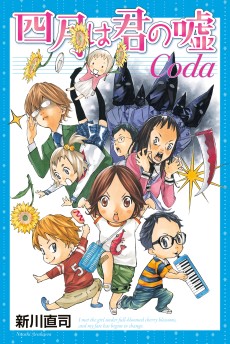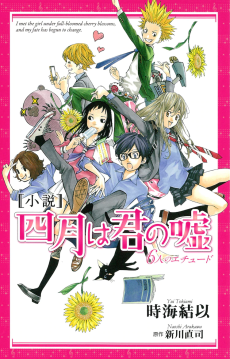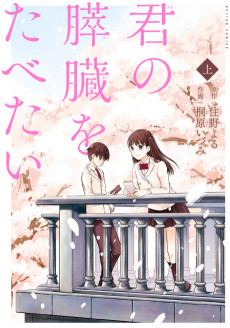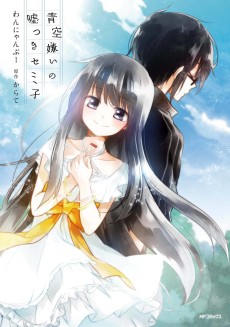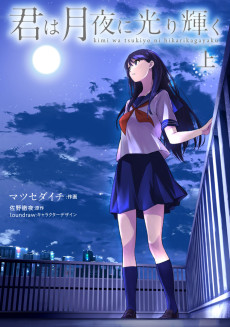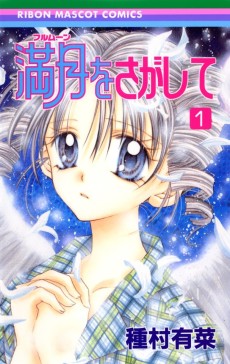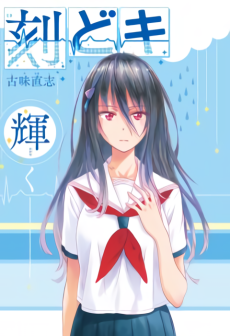SHIGATSU WA KIMI NO USO
STATUS
COMPLETE
VOLUMES
11
RELEASE
February 6, 2015
CHAPTERS
44
DESCRIPTION
Kosei Arima was a piano prodigy until his cruel taskmaster of a mother died suddenly, changing his life forever. Driven by his pain to abandon piano, Kosei now lives in a monotonous, colorless world. Having resigned himself to a bland life, he is surprised when he meets Kaori Miyazono, a violinist with an unorthodox style. Can she bring Kosei back to music, and back to life?
(Source: Kodansha Comics)
Note: Nominated for the 2012 Manga Taisho Awards.
CAST
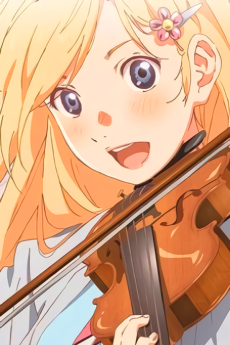
Kaori Miyazono
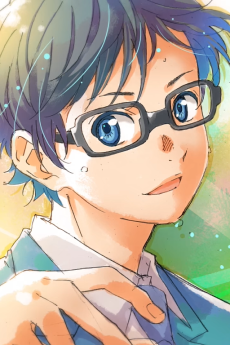
Kousei Arima
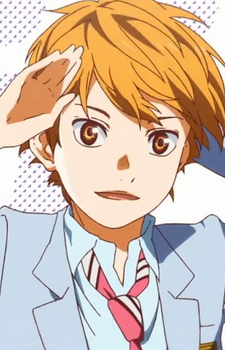
Ryouta Watari
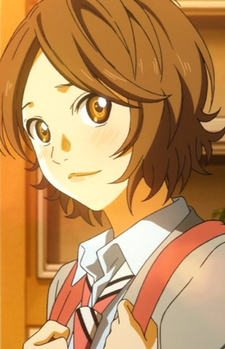
Tsubaki Sawabe
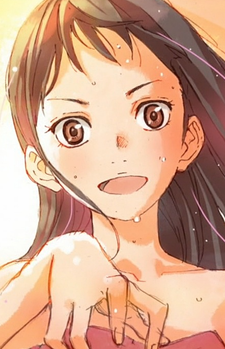
Emi Igawa
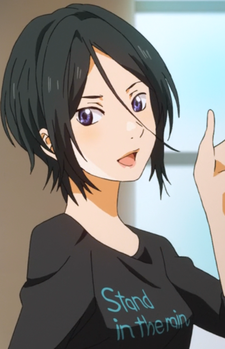
Hiroko Seto
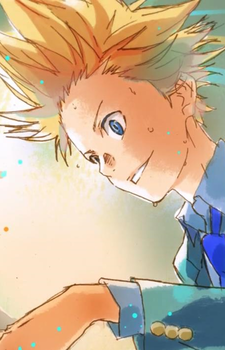
Takeshi Aiza
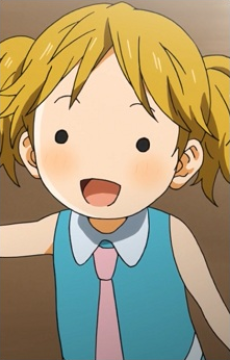
Koharu Seto
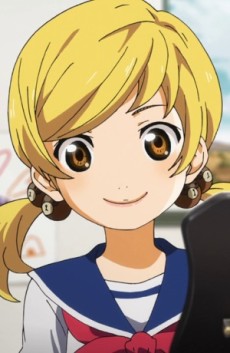
Nagi Aiza
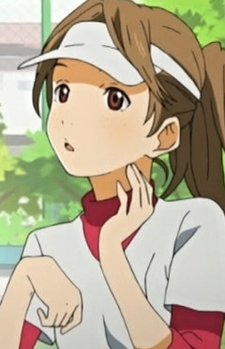
Nao Kashiwagi
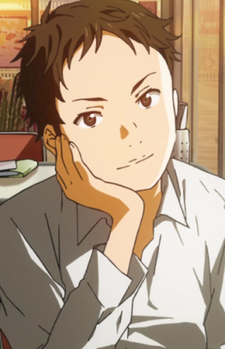
Saitou
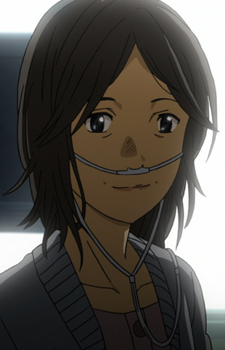
Saki Arima
CHAPTERS
RELATED TO SHIGATSU WA KIMI NO USO
REVIEWS

GGShang
100/100A deep look into the power of giving and receivingContinue on AniListYour Lie in April is widely known as one of those tear-jerker series because of its ending while also just being well liked in general. You could honestly put this review for either the manga or the anime since they're so similar to each other, but I decided to write it here since there was nothing written for this masterpiece. So then what can be said that hasn't already been said about this manga?
Your Lie in April tells the story of Kousei Arima, a child piano prodigy who can no longer hear the sound of his playing. This was birthed through the traumatic upbringing of his mother who taught him the piano. One day, he meets Kaori, a violinist, who makes him come listen to her play and eventually leads him out of the rut that he was in to fully appreciate playing the piano once more. Along the path of recovery he comes across old and new faces who see him as musical rivals and this further pushes him to take up the piano and express himself through it. It's hard to go much deeper into the plot without spoiling anything major so I'll just stop there. It's a pretty sound and diverse plot with a bunch of different arcs all showing little portions of Kousei's development throughout the story. There's a mix of romance, a little bit of drama, heavy introspection, tragedy and competition, not to mention a ton of character growth.
When we take a look at all the characters present throughout the story, you can honestly say that only two of them feel like pretty fully fleshed out characters while the rest are more just there for the ride and feel a lot less thought out. That being said, it's honestly fine since the story makes it clear that it is fully about Kousei and his journey. We aren't here to learn about what it's like to compete in a musical way or to talk about cliche high school love triangles and what not. We're here to see how Kousei, this once bright and enthusiastic young boy grew to loathe then love the piano again. We're here to see how those around him changed his life, and how he changed theirs. And that is what I really want to talk about, the theme of giving and receiving.
When I look at Your Lie in April, what I see is an amazing representation of how people are meant to live their lives: in relationship. When we look at how people interact, this is all that there is. All relationships, whether it be platonic, romantic, familial or professional are all based on a giving and taking of time, energy and love (for some of them). If either giving or receiving is missing in a relationship, it slowly becomes toxic and harmful for everyone involved. We see this when we look at Kousei's relationship with his mother. To him, all he wanted to do was to play the piano for his mother to help her get better. He was constantly pouring himself out on the stage thinking solely of her. Yet at the moment when he felt like he gave his finest, he was met with rejection, and that broke him. He soon becomes isolated and self-focused. That is, until Kaori comes and begins to pour back into his life. She forces him to take his eyes off himself, to step out of isolation and to learn to receive again. And once this cycle begins again for Kousei, it keeps on going. The rivals he once inspired as a child come back to inspire him and push him on towards being a better pianist. His friends that have stuck by him this whole time begin to pour into him, helping him to make decisions he was hesitant towards and to keep moving forward. And finally, when Kaori finds herself in a time of desperate need, Kousei begins to give his all for her, returning everything she did for him: all of the love and joy of playing music and the hope that comes with it.
There is a moment in the story when you see Kaori paralleled with Kousei's mother, and when you read it, you begin to get this uncomfortable feeling in your stomach since we've already seen where this story leads. Yet we see that things are different this second time around. Why is that? It's because Kousei was not alone anymore. He no longer had the entire weight to bear by himself. He has friends that come to help him, his rivals that push him on, and the healing and joy Kaori had given him. He was no longer just emptying himself out, only to be left as a husk of a man. He was in healthy relationships with others, and this allowed him to change what history dictated was going to happen.
Wow, so how's that for a full blown analysis of just one aspect Your Lie in April? There's honestly so much more you could talk about, so it's no wonder why even famous mangakas hold this story as one of the most well written manga of all time. Your Lie in April is a beautiful story about redemption and healing, of the power of healthy relationships and about the expression that comes through music. You may not find it as sad as most people like to advertise, but you would be honestly hard pressed to say that it is not a masterpiece in storytelling or character development.

LassOfGloucester
68/100I have many conflicting feelings on this series, but in the end it is worth the experience.Continue on AniListYour Lie in April is a series that I first experienced via its anime adaptation, after which I picked up the manga. This experience was back during my first year of high school. Now that I’m about to enter my final year of college, I figured that I would go back and revisit it since I remember having a lot of complicated feelings about it when I first watched and read it. Revisiting the manga was a very interesting experience, one where some of my old opinions remained while others stayed the same. All in all, my feelings on this series are still very conflicted, although not for the exact same reasons they were when I was younger.
For the past two years, Kosei Arima’s world has been gray and monotone. When he was younger, he was a renowned piano player known for playing the score right down to the very letter-an ability that led to people labeling him the “Human Metronome” and thinking of him as his mother’s puppet. Kosei’s mother Saki wished to be a pianist herself, and decided to teach her son so he could fulfill her dream of going overseas. As she started to get sicker however, she began to be much harsher towards Kosei, often physically beating him until he got the score perfect and making him spend all his time on his piano lessons. After her death and a performance where he stopped playing part way through due to a breakdown, Kosei walked away from the piano altogether. But one day in April, Kosei meets Kaori Miyazono, a brash and spirited violinist who demands that he must be her accompanist at her next performance. Color slowly starts to come back into Kosei’s life, and he begins to return to music again.
The beginning of this series (Approximately the first three volumes, as I read this series physically) was probably the part of it that I enjoyed the least. Tsubaki and especially Keori’s attitudes towards Kosei in regards to him getting back into piano were just far too pushy and abrasive for my liking. The slapstick at the expense of Kosei (Which unfortunately persists throughout the series) doesn’t really vibe with me considering the physical abuse he went through as a child, and it’s particularly prominent at this point in the story. It’s clear from his admiration of Kaori and her music that Kosei still very much cares about the art form and possibly even wants to go back to it. Maybe if he was inspired to return to the thing that previously hurt him so much by Kaori and her unusual playing style on his own terms instead of her basically strong-arming him into it, I wouldn’t feel as uneasy as I do. Once Kosei actually returned to music around the fourth volume however, I started to get more invested in what was going on.
The introductions of Takeshi and Emi and their personal rivalries with Kosei were honestly more interesting to me than the romance storyline. In general, my favorite parts of the story were the parts focused on music. I really enjoyed the competition aspect, and both of Kosei’s rivalries with Takeshi and Emi are entertaining to read about. You really can feel the passion the characters have for their craft, and the applause from the audience at the end of their performances is properly cathartic. Of particular note is the storyline involving Nagi Aiza, which I remember hating the first time I experienced this story but found myself enjoying quite a bit this time around. I think that I was a lot more sympathetic to her frustration with her brother for spending all his time obsessing over Kosei at the expense of his relationship with her. It’s also a chance for Kosei to display all that he’s learned since returning to piano and passing that onto another person. Would’ve been nice without the Kosei torture at the beginning, though.
The characters are probably what contribute to my mixed feelings on this series the most. Kosei has gone through a lot of trauma in his life that has shaped who he is as a person. The way the story handles said trauma is a bit shaky in my opinion. I’ve already mentioned how the slapstick at his expense undermines the serious attention they give to his abuse, and the way they ultimately resolve it doesn’t fully sit right with me. The fact that the majority of the female cast of this series have motivations that ultimately revolve around him is something I don’t particularly like. He is the main character so the attention is focused on him a lot of the time of course, but I believe that having pretty much the entire relevant female cast revolve around him is emblematic of how female characters often tend to be written in shonen series. Despite my misgivings with how parts of him are written, I do like Kosei and was rooting for him to succeed and be happy throughout the manga and afterward.
I’m gonna get the other supporting cast members out of the way before I get to our two female leads. Watari is fine. I don’t have any particular strong feelings towards him, positive or negative. I briefly mentioned Emi and Takeshi earlier, and I really like both of them. Takeshi initially comes off as a hot-blooded shonen rival type, but after his first performance it’s pretty clear that that isn’t really the kind of boy he is and he and Kosei genuinely seem to get along okay outside of their piano rivalry. I like Emi a lot, and I wish we could have seen more performances from her outside of her big one after her introduction. She does fall into the “Every female character in this series revolves around Kosei” problem that I mentioned earlier, but if I’m being honest I was kind of rooting for her to get with them even though I know it’s completely hopeless. Maybe, just maybe, they’ll get to know each other more in the future. Nagi was a character I disliked at first due to her torment of Kosei, but I grew to like her a lot more because her struggle was understandable to me.
I’m going to put my thoughts on the main two girls under spoiler tags because I really do have a lot to say about them.
Kaori is a character I think I can ultimately say I like. She does not have the best first impression, as her pushiness to get Kosei back into music combined with the Kosei abuse just makes her come across as insensitive and uncaring towards his trauma. Her general vibe also comes across as a bit overly quirky and cloying, like the manic pixies so many people loathe. As we learn more of her struggles and especially after we learn her true motives in the ending. She ultimately just wanted to die with no regrets, and wasn’t afraid to be pushy about it if she had to. This does make her selfish, but the selfishness is ultimately understandable to me at the end of the day considering that she is dying and has known it for quite a while.
Tsubaki, on the other hand, I have extremely mixed feelings on. Like Kaori she was also overly pushy towards Kosei in the beginning, but unlike her she starts to grow more resentful of music as the series goes on, viewing it as taking Kosei away from her. She wants to be by his side forever, even at the expense of what he wants to do with his future. She ends up telling Kosei that he has no choice but to fall in love with her since the girl he likes is dying. The combination of those things prevents me from liking her, but she’s also just a fourteen year old and nobody really thinks fully rationally at that age. The amount of “Why are people hating on this female character for doing this bad and immature thing she’s just a teenager” posts I see online do not help. I haven’t seen any about Tsubaki specifically but she is definitely under that umbrella. Part of me wonders if anyone would defend her if she was a male character who was saying those things to a female character, but that’s a discussion for another time.
Back to not talking about spoilers, I will say that I did really like the ending. It is part of the reason I gave the series a re-read in the first place, as it is something that practically begs you to go back and look for any hints of foreshadowing. Re-reading it at a different part of my life is what I believe has allowed me to be more understanding towards certain characters actions as well. The ending is what I remember enjoying the most from my first readthrough of this series, and while it was not my definitive favorite part of this readthrough it was still something I highly appreciated and enjoyed.
I really like Your Lie in April’s art style. Naoshi Arakawa does a great job at conveying the emotions the characters are feeling, especially during the scenes when the characters are playing music. I can practically hear them playing the music as I read the pages. The manga takes place over the course of about a year, and the change of seasons is very evident in the art. While the actual style does not really change that much between seasons, Arakawa’s art conveys the feelings of each season perfectly, from the breeze of spring to the youthful energy of summer to the uncertainties of fall to the melancholy of winter. I will surely be checking out his other works in the future.
It's been a while since I've seen the anime, but I honestly think it might be the superior version of this story. The beautiful animation and the fact that you can actually hear the characters playing their music really helps elevate it (Hikaru Nara is a Top 10 op for me as well). While I cannot say that I love this series, it is not something that I regret reading at all, and the good points ultimately make it worth experiencing even if it’s not perfect. I have seen a wide variety of opinions on this series over the years, and I am sure that many people who read this will agree with me and that many won’t. Ultimately, I would encourage people to read the series themselves and form their own opinion.
SIMILAR MANGAS YOU MAY LIKE
 MANGA Drama3-gatsu no Lion
MANGA Drama3-gatsu no Lion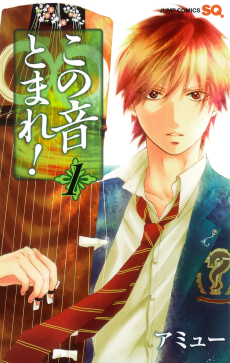 MANGA DramaKono Oto Tomare!
MANGA DramaKono Oto Tomare!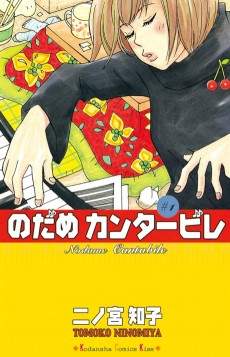 MANGA ComedyNodame Cantabile
MANGA ComedyNodame Cantabile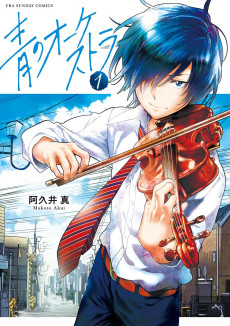 MANGA DramaAo no Orchestra
MANGA DramaAo no Orchestra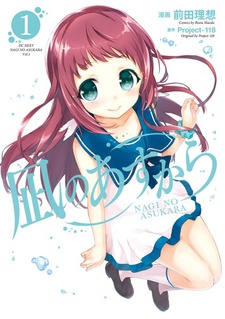 MANGA DramaNagi no Asu Kara
MANGA DramaNagi no Asu Kara MANGA DramaBlue Period
MANGA DramaBlue Period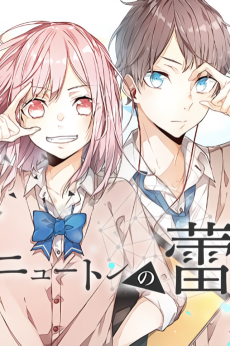 MANGA RomanceNewton no Tsubomi
MANGA RomanceNewton no Tsubomi
SCORE
- (4.1/5)
MORE INFO
Ended inFebruary 6, 2015
Favorited by 746 Users


